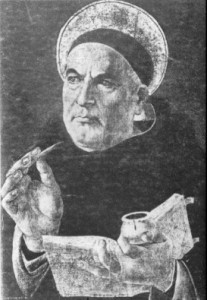
 As I noted previously, I’ve been involved this month in a panel discussion over at Cato Unbound on the issue of “Conservative-Libertarian Fusionism.”
As I noted previously, I’ve been involved this month in a panel discussion over at Cato Unbound on the issue of “Conservative-Libertarian Fusionism.”
My two most recent contributions to the discussion phase focus on possible resources for the question that can be gleaned from Augustine and Aquinas.
Augustine inaugurated a tradition of Christian reflection on the saeculum, the age of this world in which the wheat and the tares grow up together, and the implications of this for common life together. On the relevance of Augustine for modern considerations of political order, I recommend a recent lecture from Eric Gregory of Princeton University.
Aquinas in many respects, and as Gregory points out, should be read as a constructive interlocutor with Augustine rather than in opposition with him. Indeed, Augustine wrote in his Enchiridion that “although every crime is a sin, not every sin is a crime.” Likewise in his treatise on free choice, he observed, “The law which is framed for the government of states, allows and leaves unpunished many things that are punished by Divine providence.”
In this vein, Aquinas treats in systematic fashion the question, “Whether it belongs to human law to repress all vices?” As I contend over at Cato Unbound, Aquinas follows Augustine in answering negatively, and his discussion has some serious implications for how both conservatives and libertarians ought to think about the limits of the law: “Conservatives and libertarians ought to recognize that positive law is not meant to repress all vices or to promote all virtues.”

